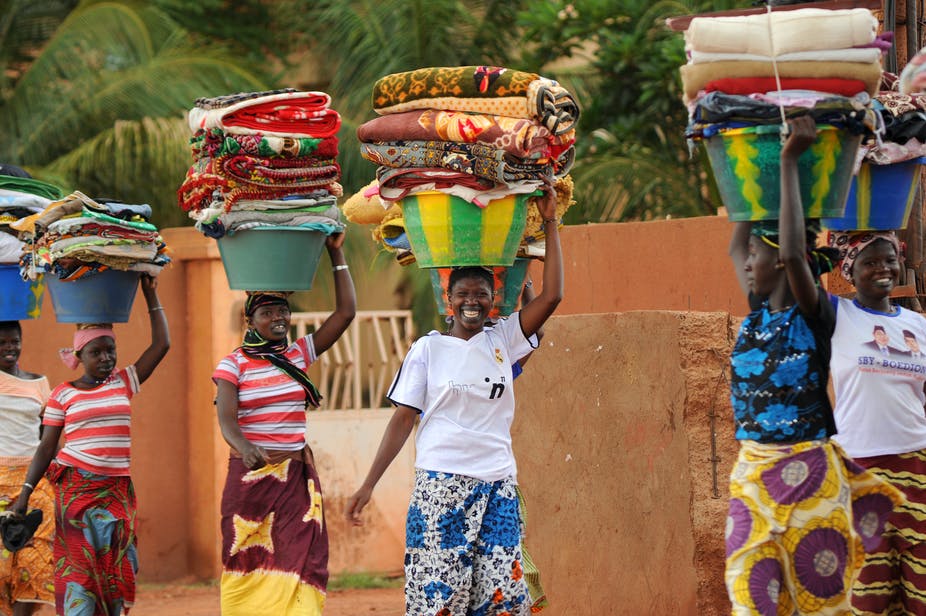In Africa, creating a free market for water using reliable water taps not only promotes conservation, it has empowered women and changed the patriarchal structures that exist in some villages.
For many women in countries like Tanzania, collecting drinking water is a daily chore. The United Nations considers a source of water “accessible” if it is at least one-third of a mile away. Women typically carry about 40 pounds of water over that distance – or much farther – to supply their families’ needs for drinking, cooking, and washing.
To reduce that burden, international NGOs, the World Bank, and governments helped build water systems, including pipes and community faucets to bring water directly into town. For years, the infrastructure was built by outside groups and then turned over to national governments to operate and maintain. As a result, the systems often broke down. In a state-run system no one had a real incentive to keep a complex system going.
It soon became clear that the communities served by the systems needed to play a role, so NGOs and others began turning it over to leaders in the community to manage. After all, they were the ones using the system. This sounds good, until you see the results.
“The idea that it is good to have village ownership is a myth I want to smash,” says Alison Wedgwood, the CEO of an innovative group called eWaterServcies which provides water to African villages in three countries.
“The current model sounds good because you hand over the system to the village and they have ownership,” explains Wedgwood. In reality, “There is always a head man. You are giving it to an old man and his mates and cousins, and you have given it to this patriarchal system.
Patriarchy is a term that gets abused, especially in a Western context. A female colleague who read a draft of this piece objected to the use of the term. She feels the word “patriarchy” is patronizing and assumes women are victims. In the case of Africa, whether “patriarchy” is the best term for government systems run by men, there is a need to give women reliable water systems then can control.
Handing control of water systems to the community still leaves women out. Since the burden of collecting water falls primarily on women, so too do the costs when that system fails.
Recognizing this, many NGOs required local committees overseeing water infrastructure to be composed equally of men and women. This, unfortunately, didn’t actually empower women. Going to the meetings, Wedgwood says, “The women are always sitting on the floor and the men are sitting on the chairs,” a positioning emblematic of their relative power. To truly empower the women, the system needed to move from communal ownership to a free market. That’s where eWaterSystems comes in.
The problem with many water systems is that there isn’t a steady stream of revenue to pay for maintenance. As a result, half of all water systems fail fewer than two years after they are installed. The eWaterPay spigot, however, allows people to pay for water with their cell phones, transferring the money to managers of the system. If the system is broken, people don’t use the spigots and system managers don’t get paid, so they have a strong incentive to keep the system working and fix broken pipes and spigots. As a result, more than 90 percent of water systems using eWaterPay are working.
This is good news for the women of these communities.
Rather than having to spend time carrying heavy loads of water from local streams, they can get the water directly from a working faucet right in town. And, since they can turn the spigot on themselves using a wireless key (like one used to start cars), they can get water any time and access as much as they need without wasting it because they pay for every drop. This is a dramatic improvement over spigots that require waiting for someone from the water system to come and turn it on, which is the system used for many of the communal faucets. As a result, the data show faucets are used anywhere from 4:00 a.m. to midnight, allowing people to get water when it is convenient.
“If we make it easy to access water, women can go to work and girls can go to school,” says Wedgwood.
Free markets give women the ability to access water by giving them more control over their daily routine. Unlike socialized systems, a market for water destroyed the existing unequal structure, giving women power and time to improve their standard of living.
It seems strange that something as simple as a water spigot could make such a difference. But that is the power of markets. By providing incentives and holding people accountable for failure, they distribute power, opening new opportunities for women in countries like Tanzania and Ghana.










